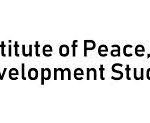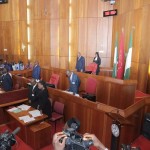Senate Unhappy Over Jonathan’s Refusal To Sign N1bn Constitution Amendments Excercise Into Law
Featured, Latest Headlines Thursday, April 16th, 2015
Ayodele Afolabi, Abuja – Senators were dismayed by President Jonathan’s refusal of assent to the Constitution of the Federal Republic of Nigeria (Fourth Alteration) Bill 2015 sent to him for assent by the National Assembly.
President Jonathan had in a letter of refusal of assent on the bill dated 13th April 2015 and read on the floor of the Senate by the Senate President, David Mark, raised unconstitutionality of some of the proposed amendments as reasons for his refusal of assent
This development made the Senate Committee on Constitution Review, to hurriedly embark on two day retreat on issues raised in the letter by the President starting from yesterday as a way of saving the N1billion exercise from total waste.
Worried by far reaching constitutional issues raised by President Jonathan in the letter as loudly read by Mark, Senator Sadiq Yar’Adua ( APC Katsina Central) moved a motion through a point of order, for the Senate to debate the letter but the Senate President rejected his suggestion on the grounds that Senators were not yet in possession of copies of the letter .
“Yes, the letter contains far reaching constitutional issues that must be debated by the senate as regards their plausibility to the President’s decision but since the senators have no copies now and since the Senate Committee on Constitution Review had already swung into action with their two day retreat on the subject matter for the needed way out, there is no need for any general debate now”, he said.
President Jonathan in the six – page letter titled: “Re: Constitution of the Federal Republic of Nigeria (Fourth Alteration) Act, 2015” , picked holes in 12 out of the 23 amendment provisions, one of which is section 4 of the fourth alteration act seeking to alter section 9 of the 1999 constitution by insertion of a new sub section 3A, dispensing assent of the President to any constitution amendment act.
The letter reads: “May I draw Your Excellency’s esteemed attention to the Constitution of the Federal Republic of Nigeria (Fourth Alteration) Act, 2015 that has been passed by the National Assembly and transmitted to me for assent.
“I have accordingly examined the substance of the provisions and the procedure adopted by the National Assembly to pass the Act and wish to observe as follows:
“Section 4 of the Fourth Alteration Act, 2015 seeks to alter Section 9 of the 1999 Constitution by the insertion of a new subsection 3A, which dispenses with the assent of the President in the process of constitutional amendment.
“However, this alteration can only be valid if the proposal was supported by the votes of not less than four-fifth majority of all the members of each House of the National Assembly and approved by a resolution of the House of Assembly of not less than two-thirds of all the States as provided by Section 9 (3) of the 1999 Constitution.
“ This is a fundamental requirement of the Constitution and in the absence of credible evidence that this requirement was met in the Votes of Proceedings of the National Assembly, it will be unconstitutional for me to assent to this Bill.“In light of the above, I am of the respectful view that I should withhold assent until it can be shown that the National Assembly has complied with the threshold specified in Section 9 (3) of the 1999 Constitution.
“However, assuming without conceding that the necessary thresholds were met by the National Assembly, there are a number of provisions in the Act that altogether constitute flagrant violation of the doctrine of separation of powers enshrined in the 1999 Constitution and an unjustified whittling down of the executive powers of the federation vested in the President by virtue of Section 5(1) of the 1999 Constitution.
“The said Section 45A of the Fourth Alteration Act 2015, which guarantees the right to free basic education is too open ended and should have been restricted to government schools.“This is because, a right unless qualified or restricted must be observed by all. It follows therefore that the right to free basic education under this provision if taken to its logical conclusion, will invariably apply to private schools, which could not have been the intendment of the legislature.
“This same argument applies to Section 45B, which guarantees unqualified right to free primary and maternal care services. The implication of this is that private institutions will be obliged under Constitution to offer free medical services since it is a right and this is not only impracticable, but also could not have been the intention of the law giver.“
There is therefore the need for these provisions to be redrafted to restrict the enjoyment of these rights and place the obligation to provide the conditions necessary for the enjoyment of the rights on the government.
”Jonathan also queried the limitation of the power of the President to withhold assent to bills to 30 days.He said 30 days might not be sufficient for a President to go through such bills.He said: “The power vested in the President to withhold his assent to Bills passed by the National Assembly is part of the checks and balances contained in the Constitution.
“Withholding of assent therefore constitutes a check on the exercise of legislative powers in a constitutional democracy especially as the Executive Branch has the responsibility of enforcing laws passed by the National Assembly. However, some of the Acts of the National Assembly emanate from Private Members’ Bills, which in many cases, the Executive may not have had sufficient input.“ It is also instructive to note that in some cases, more than one Bill is transmitted to the President for assent and that the President requires the advice of relevant agencies of government before he can assent to the Bill.
“Against this background, the 30 days allowed for assent of the President may not be adequate in some cases for the President to make a decision as to whether or not to assent.
”The President also disagreed with the lawmakers for restricting the President’s right to spend funds in default of appropriation to three months instead of six months.He said the amendment by the lawmakers does not take into cognizance unforeseen circumstances the nation might go through any time.
He added: “This alteration seeks to limit the period when expenditure can be authorized in default of appropriation from the 6 months provided in the Constitution to 3 months.
“I am of the view that this provision has the potential of occasioning financial hardships and unintended shutdown of government business particularly where four unforeseen reasons and exigencies in the polity, the National Assembly is unable to pass the Appropriation Act do not justify the reduction of the six-month time limit in the Constitution. I am of the respectful view that the current position should have been maintained.
”He blamed the National Assembly for recommending that the National Economic Council(NEC) should henceforth appoint the Accountant-General of the Federation.He said: “The provision of section 84A that creates the new Office of Account-General of the Federation distinct from Accountant- General of the Federal Government has not addressed the funding requirement for the establishment of the office.
“It is necessary to clarify for instance, who staffs and funds the office of Accountant General of the Federation and from whose budget he will be paid since he serve the three tiers of Government.
“It is also important to state who will exercise oversight powers over the office. Furthermore, the National Economic Council, which is mainly an advisory body, is now charged with the responsibility of recommending those to be appointed to the Office of Accountant General of the Federation.
”Jonathan described the amendment on the separation the Office of Attorney General of the Federation from the Minister of Justice as ambiguous.He said: “These alterations encapsulate wide-ranging provision that seek to separate the Office of Attorney General of the Federation from the Minister of Justice and the Attorney General from the Commissioner for Justice in the respective States of the federation. They also provide for the independence of the Office of Attorney General by guaranteeing tenure and funding.
“However, as desirable as the separation is, there are some provisions that validate the doctrine of separation of powers and also negate the age-long independence and absolute discretion that the office has enjoyed for centuries since it creation in middles ages. The potential challenging provisions are discussed below:
“The first noticeable set back is that the Fourth Alteration Act 2015 is silent on who is the Chief Law Officer of the Federation/State. This is serious lacuna, which may create implementation challenges.“It will be recalled that the Attorney- General of the Federation (AGF) and Minister of Justice and the Attorney General and Commissioners for Justice in the respective States of the federation are under sections 150 and 195 of the 1999 Constitution, the Chief Law Officers respectively.
“Apparently, it is the fact that the AGF is the Chief Law Officer has the power to guide the MDAs on legal issues by way of legal advice and represent the Government on other legal matters including civil litigations, contract, treaty obligations, legal drafting, etc., is derived.“With this amendment, which limits the power of the AGF to criminal prosecution and silent on whom who is the Chief Law Officer, it appears to erode the constitutional and legal basis for the current structure and functions of the Ministry of Justice and the Law Officers employed therein, in the absence of a Statute that provides for the exercise of these powers and functions.
“Consequently, if it is the intendment of the National Assembly to make the Minister of Justice, the Chief Law Officer, it should be expressly stated. This will enable these functions to continue to be traditionally performed by the Ministry under the supervision of the Minister of Justice while the Office of the AGF, which is to be independent and separated from the Ministry, concentrate on prosecutions.”
Related Posts
Short URL: https://www.africanexaminer.com/?p=23215




















